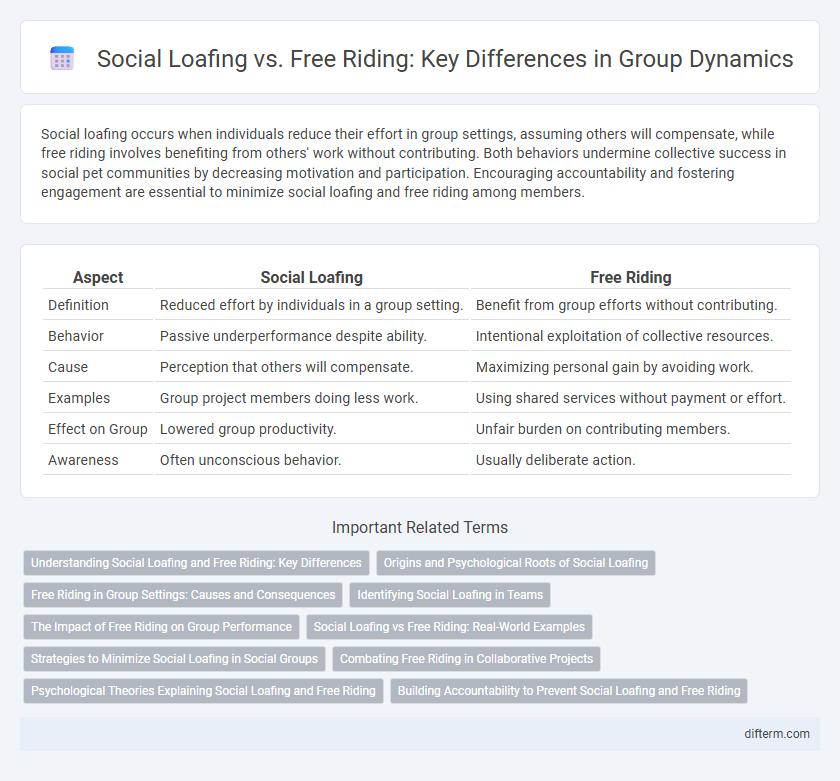Social loafing occurs when individuals reduce their effort in group settings, assuming others will compensate, while free riding involves benefiting from others' work without contributing. Both behaviors undermine collective success in social pet communities by decreasing motivation and participation. Encouraging accountability and fostering engagement are essential to minimize social loafing and free riding among members.
Table of Comparison
| Aspect | Social Loafing | Free Riding |
|---|---|---|
| Definition | Reduced effort by individuals in a group setting. | Benefit from group efforts without contributing. |
| Behavior | Passive underperformance despite ability. | Intentional exploitation of collective resources. |
| Cause | Perception that others will compensate. | Maximizing personal gain by avoiding work. |
| Examples | Group project members doing less work. | Using shared services without payment or effort. |
| Effect on Group | Lowered group productivity. | Unfair burden on contributing members. |
| Awareness | Often unconscious behavior. | Usually deliberate action. |
Understanding Social Loafing and Free Riding: Key Differences
Social loafing involves individuals exerting less effort when working in a group compared to working alone, driven by reduced accountability and diffusion of responsibility. Free riding occurs when individuals intentionally benefit from the group's efforts without contributing, motivated by self-interest and exploitation of shared resources. Understanding these behaviors is crucial for improving group dynamics, accountability measures, and collaborative productivity in social and organizational settings.
Origins and Psychological Roots of Social Loafing
Social loafing originates from a diffusion of responsibility where individuals exert less effort in group tasks due to decreased accountability. Psychological roots of social loafing include reduced motivation and the perception that individual contributions are less identifiable or impactful within collective efforts. This phenomenon contrasts with free riding, which involves exploiting shared resources without contributing, stemming from a strategic choice rather than diminished effort.
Free Riding in Group Settings: Causes and Consequences
Free riding in group settings occurs when individuals exploit collective efforts by contributing less while benefiting from others' work, often driven by perceived anonymity and minimal accountability. This behavior undermines group productivity, leading to decreased motivation among diligent members and the potential collapse of cooperative initiatives. Understanding the psychological and situational causes of free riding is crucial for designing effective strategies to foster fair participation and sustain group cohesion.
Identifying Social Loafing in Teams
Social loafing in teams manifests when individual members exert less effort compared to when working alone, often due to perceived diffusion of responsibility. Identifying social loafing involves monitoring uneven contributions, reduced participation, and inconsistent task completion within group settings. Effective detection hinges on transparent performance evaluations and fostering accountability to minimize free riding behaviors.
The Impact of Free Riding on Group Performance
Free riding significantly undermines group performance by reducing overall motivation and productivity, as individuals rely on others to complete tasks without contributing their fair share. This behavior creates imbalances in workload distribution, leading to decreased group cohesion and increased resentment among members. Studies show that groups experiencing high levels of free riding often fail to achieve desired outcomes and may suffer long-term damage to collaboration and trust.
Social Loafing vs Free Riding: Real-World Examples
Social loafing occurs when individuals exert less effort in a group task because their contributions are less identifiable, such as employees in a team project producing lower output than when working alone. Free riding happens when people benefit from the efforts of others without contributing themselves, commonly seen in public goods situations like vaccination campaigns where some opt out but still gain herd immunity. Real-world examples include study groups where some members rely on others to carry the workload (social loafing) versus public broadcasting supporters who avoid donations but still consume content (free riding).
Strategies to Minimize Social Loafing in Social Groups
Implementing clear individual accountability and assigning specific roles reduces social loafing by ensuring each group member's contributions are visible and measurable. Encouraging intrinsic motivation through meaningful tasks and fostering a strong group identity enhances engagement and minimizes free riding behaviors. Regular feedback and setting performance standards promote responsibility and collective commitment within social groups.
Combating Free Riding in Collaborative Projects
Combating free riding in collaborative projects requires clear task allocation and ongoing performance monitoring to ensure individual accountability. Implementing peer evaluations and transparent contribution tracking fosters a culture where efforts are visible and rewarded. Leveraging digital collaboration tools like project management software enhances coordination and minimizes social loafing by promoting active participation.
Psychological Theories Explaining Social Loafing and Free Riding
Social loafing and free riding are explained by psychological theories such as the Diffusion of Responsibility, where individuals exert less effort in group tasks because responsibility is perceived as shared among members. Expectancy Theory highlights that individuals reduce effort when they believe their contribution does not significantly impact the group's outcome or when rewards are not directly linked to their performance. Social Impact Theory suggests that motivation decreases in larger groups as personal influence and accountability diminish, reinforcing tendencies toward loafing and free riding behaviors.
Building Accountability to Prevent Social Loafing and Free Riding
Building accountability in group settings reduces social loafing and free riding by clearly defining individual roles and responsibilities. Implementing peer evaluations and transparent progress tracking fosters a sense of ownership and motivation among team members. Utilizing technology tools for real-time performance monitoring enhances accountability and discourages passive participation.
social loafing vs free riding Infographic

 difterm.com
difterm.com